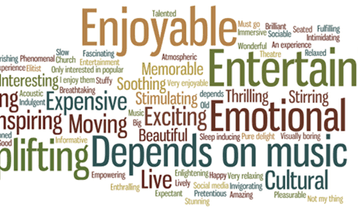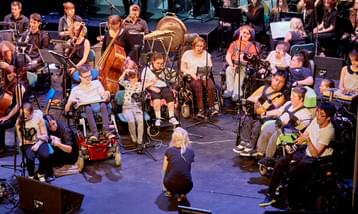Digital is real life - the future of orchestral audiences
NewsNews Story
There’s been a lot of chat recently about vanishing classical music and orchestral audiences by journalists. Ofcom's latest Online Nation report headlines provide yet more potentially existential questions for our sector.
The internet touches nearly every aspect of our lives: working, socialising, entertainment, shopping, finding out information, accessing services and engaging as a consumer and a citizen.
For many internet users, particularly the young, online and offline life are increasingly integrated. An average young person is likely to see no real difference between talking to friends over WhatsApp and talking to them in person. Online experiences are becoming just experiences, without any distinction between in-person and digital.
As a sector we still delineate between the two, and place more emphasis and value on the in-person experience. Even with potential new audiences, we concentrate on how we’ll get them into a venue, rather than how we could service them online.
62% of UK individuals say being online gives them the space to pursue hobbies and interests in a way they can’t offline. Sport understands this and as David Taylor excellently explains in his article, many sports place more emphasis on creating online experiences specifically for their millions of virtual fans, as opposed to the small number who can be in a stadium. They’ve even worked out ways to generate income from this too!
Our competitors are not who we think they are
Fifty-eight per cent of UK individuals* now watch video games-related content and spend an average of 7.5 hours a week doing so. That doesn’t leave much time for other leisure/social activities!
Traditionally, marketeers look at competitors as other orchestras, concert halls, and venues because we view competition through the lens of competing for ticket revenue, rather than time and attention.
With UK individuals spending an average of four hours a day online in their spare time, the biggest competitors for our sector are Netflix, Spotify, e-sports, internet browsing. With a cost-of-living crisis, which will see personal spending tightened, cheaper online experiences will become the default for entertainment and leisure time. We need to start thinking differently about the competition and what we do to attract eyeballs and ears to us.
Online opens access and personalisation is key
83% of UK individuals say that accessing goods and services online is more convenient than in-person. It is often cheaper too.
We know from the pandemic that online experiences and events can open up access to more groups from our society than in-person experiences. This move to digital services has become embedded for many sectors which have seen growth in this area since lockdowns ended.
1.5 million tickets were sold for the recent Commonwealth Games with 28.6 million watching on the various BBC TV and online channels. Of course, it was never going to be feasible for many people in the UK to travel to Birmingham and/or afford the ticket prices but watching online or on TV still allowed people to enjoy the sport and feel part of the occasion. They could also choose when to do this, through on demand services. This personalisation aspect is really important, as it allows audiences to engage on their own terms and fit it around their busy lives.
Where are the answers?
The answers lie beyond and not within our sector. If we keep looking only at each other, progress will continue to be glacial. What is considered innovative in our sector based on our own comparisons with each other, is positively years behind where others within the Digital, Culture, Sport and Media brief currently are. We pride ourselves on being a creative, curious and collaborative sector, but we need to demonstrate this and look beyond our small bubble, if we are to find answers to some of the existential questions facing us. There are ideas, networks and fellow collaborators waiting to be found, if we need to look up and out a bit more.
Orchestras Live is committed to supporting the sector’s learning through events like our Regenerate series, bringing together voices from outside the orchestral sector to share knowledge and best practice and challenge us to be more innovative.
*UK individuals defined as aged 13+
This blog forms part of a blog series focusing on audience engagement.


